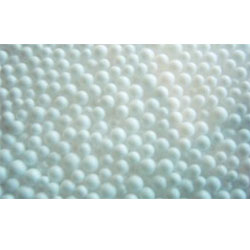 Polystyrene (PS) is a synthetic aromatic hydrocarbon polymer made from the monomer styrene. Polystyrene can be solid or foamed. General-purpose
polystyrene is clear, hard, and rather brittle. It is an inexpensive resin per unit weight. It is a rather poor barrier to oxygen and water vapour and has a relatively low melting point. Polystyrene is one of the most widely
used plastics, the scale of its production being several million tonnes per year. Polystyrene can be naturally transparent, but can be coloured with colourants. Uses include protective packaging (such as packing peanuts and
CD and DVD cases), containers, lids, bottles, trays, tumblers, disposable cutlery and in the making of models.
Polystyrene (PS) is a synthetic aromatic hydrocarbon polymer made from the monomer styrene. Polystyrene can be solid or foamed. General-purpose
polystyrene is clear, hard, and rather brittle. It is an inexpensive resin per unit weight. It is a rather poor barrier to oxygen and water vapour and has a relatively low melting point. Polystyrene is one of the most widely
used plastics, the scale of its production being several million tonnes per year. Polystyrene can be naturally transparent, but can be coloured with colourants. Uses include protective packaging (such as packing peanuts and
CD and DVD cases), containers, lids, bottles, trays, tumblers, disposable cutlery and in the making of models.
As a thermoplastic polymer, polystyrene is in a solid (glassy) state at room temperature but flows if heated above about 100 °C, its glass transition temperature. It becomes rigid again when cooled. This temperature behaviour
is exploited for extrusion (as in Styrofoam) and also for molding and vacuum forming, since it can be cast into molds with fine detail.
Polystyrene is slow to biodegrade. It is accumulating as a form of litter in the outdoor environment, particularly along shores and waterways, especially in its foam form, and in the Pacific Ocean. EPS(Expandable Polystyrene) is a lightweight, rigid, plastic foam material produced from solid particles of polystyrene. As it is made of 95% air, it is therefore extremely safe and above all, non-toxic. Depending on the products, their type of container for transportation, and the amount of protection required and movement allowed, will decide whether to use chips or beads for the transporting. Beads normally for small objects with reduced packing space.